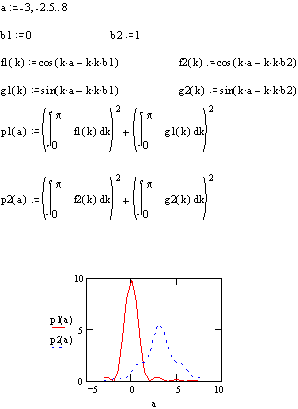
Spreading of a
wave packet
We can terminate the Taylor series expansion
β(k) = β(k0) + (k - k0)dβ(k)/dk|k0 + ½(k - k0)2d2β(k)/dk2|k0
+ ...
after the first term if all higher order terms are much smaller than 2π.
However, as t increases, the higher order terms increase
steadily with t. Therefore the second order term must be included for
times greater than some t1.
We have
d2β(k)/dk2|k0 = d2α(k)/dk2|k0
+ d2ω(k)/d2k|k0t, d2ω(k)/d2k
= ħ/m.
Therefore d2β(k)/dk2|k0 depends on t, and
for large enough times t its magnitude increases with time.
The wave packet is the of the form
Ψ(x,t) ∝ ∫|g(k)|
exp(i((k - k0)(x - x0
- vgt) - (k - k0)2x1)
dk, x1 = -½d2β(k)/dk2|k0.
x1 depends on t, and for large enough times t its magnitude increases
with time.
Ψ(x,t) ∝ ∫|g(k)|
exp(i2π(k - k0)/τ)
dk, with τ = 2π/((x
- x0 - vgt) - (k - k0)x1).
Now |x - x0 - vt |>> Δk-1 is no
longer sufficient for |τ| <<
Δk.
We need |(x - (k - k0)x1) - x0 - vt | >> Δk-1 for the integrand to oscillate rapidly and the
contribution to the integral to be zero.
The width of the wave packet increases with time.
Example:
Let |g(k)| = 1 for k0 < k < (k0 + π).
Then
Ψ(x,t) ∝ ∫k0k0+π
exp(i(k - k0)(x - x0
- vgt) - (k - k0)2x1)
dk
= ∫k0k0+π
cos((k - k0)(x - x0
- vgt) - (k - k0)2x1)
dk + i∫k0k0+π sin((k - k0)(x - x0
- vgt) - (k - k0)2x1)
dk.
P(x,t) = |ψ(x, 0)|2 = [∫k0k0+π
cos((k - k0)(x - x0
- vgt) - (k - k0)2x1)
dk]2
+ [∫k0k0+π
sin((k - k0)(x - x0
- vgt) - (k - k0)2x1)
dk]2.
Let x - x0 - vgt = a, x1 = b.
Compare P(x,t) at t = 0
when b = 0 and at some later time when b ≠ 0.

Problem:
In one dimension, at t = 0 the normalized wave function of a free particle of
mass m in k-space is
Φ(k,0) = N exp(-k2/(2b2)).
(a) Find the normalization constant N. Find the expectation value <p> = ħ<k>.
(b) Find the FWHM in of |Φ(k,0)|2 in k-space.
(c) Find the corresponding wave packet Ψ(x,0) in coordinate space. Find <x>.
(d) Find the FWHM in of |Ψ(x,0)|2 in coordinate space.
(e) Find the FWHM in of |Ψ(x,t)|2 an some later time t. Does it
change with time?
(f) Find the FWHM in of |Φ(k,t)|. Does it change with time?
Hint: ∫-∞+∞exp(-a2(x + c)2)dx =
√π/a
Solution:
- Concepts:
Postulates of QM, the Fourier transform
- Reasoning:
We investigate the properties of a Gaussian wave packet representing a
free particle.
- Details of the calculation:
(a) N2∫-∞+∞exp(-k2/b2)dk
= 1. ∫-∞+∞exp(-k2/b2)dk = b√π,
N = 1/(b√π) ½. <p> = <k> = 0.
(b) exp(-k2/b2) = ½, k = b√(ln2), FWHM = 2√(ln2)b.
(c) Ψ(x,0) = [1/(2π)1/2][1/(b√π)1/2] ∫-∞+∞exp(-k2/(2b2))exp(ikx)
dk.
Let us group the k-dependent terms into a perfect square.
-k2/(2b2) + ikx = [-1/(2b2)][k – ixb2]2
- x2b2/2,
Integrating we find
Ψ(x,0) = (b2/π)1/4exp(-x2b2/2). <x>
= 0.
(d) exp(-(x-x0)2b2) = ½. FWHM = 2√(ln2)
(1/b).
(e) Ψ(x,t) = [1/(2π)1/2][1/(b√π)1/2] ∫-∞+∞exp(-k2/(2b2))exp(i(kx
– ωt)) dk.
E = ħω = ħ2k2/(2m), ω = ħk2/(2m). dω/dk = ħk/(m)
= vg.
-k2/(2b2) + i(kx – ħk2t/(2m)) = -A[k – ix/2A]2 – x2/(4A),
where A = 1/(2b2) + iħt/(2m).
Integrating we find
Ψ(x,t) = [1/(2π)1/2][1/(b√π)1/2] √(π/A) exp(-x2/(4A))
= (4/(b2π))1/4 eiφ/(4/b4 + 4(ħt/m)2)1/4 exp(-x2/(2/b2
+ 2iħt/m)),
where φ is real and independent of x.
Here
[1/(2π)1/2][1/(b√π)1/2] √(π/A) = (4/(b2π))1/4
√(1/(4A)) = (1/(b2π))1/4 |√(1/(4A))|eiφ.
|Ψ(x,t)|2 = (4/(b2π))1/1 1/(4/b4 +
4(ħt/m)2)1/2 exp(-(4x2/b2)/(4/b4
+ 4(ħt/m)2)).
exp(-(4x2/b2)/(4/b4 + 4(ħt/m)2)) =
½. FWHM = 2√(ln2)(1/b)(1 + b4(ħt/m)2)1/2.
The FWHM of |Ψ(x,t)|2 increases with time
(f) Φ(k,t) = exp(-iωt)) Φ(k,0).
FWHM of |Φ(k,t)| = 2√(ln2)b. It does not
change with time.
Summary
The wave function of a free particle is a wave packet. The center of this wave packet
moves
with constant velocity vg, called the group velocity. The width of the
wave packet increases with time, the wave packet spreads, we gradually loose position
information.


